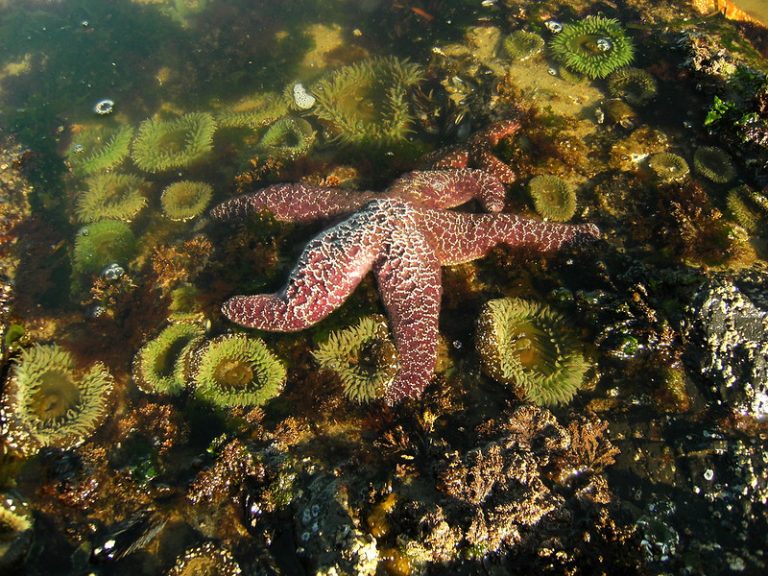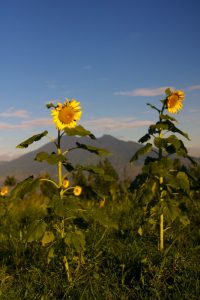
“tide pools – sea star” by Theo Crazzolara is licensed with CC BY 2.0. To view a copy of this license, visit https://creativecommons.org/licenses/by/2.0/
We are in the midst of a climate crisis. Report after report demonstrate how human actions are impacting our planet. These changes bring major consequences for many of the species we share this planet with. Unless we act now, many of the organisms we live alongside today may not be around for our children or our children’s children. In the face of these threats, how do we make sure knowledge of these life forms is passed onto future generations?
This is the question asked by Dr. Hannah Turner’s Theory and Methods in Oral History master’s course in the winter/spring of 2020. For their course project, entitled “Listening to the Earth”, Dr. Turner’s students interviewed nine UBC-based researchers about their “favourite organisms,” and how the organisms stand up to the challenges of climate change. The project was intended for exhibition at the Beaty Biodiversity Museum using an interactive speaker device called the Museum in a Box (demonstrations of the device can be viewed here). Unfortunately, like everything else in our lives, the exhibit was put on hold due to the COVID-19 pandemic. In response, Dr. Turner and her students compiled, cut, transcribed and published the interviews onto a blog page, where you can listen to them from the comfort and safety of your home. “What results,” says Dr. Turner in her introduction to the project, “are nine interviews that examine the interesting, funny, and sometimes sad, futures for these organisms.”

“The Wild Sunflower” by Adhi Rachdian is licensed with CC BY 2.0. To view a copy of this license, visit https://bit.ly/3dmKUSt
Take Postdoctoral Research Fellow for UBC’s Department of Zoology Dr. Alyssa Gehman’s interview on sea stars, or starfish as they are more colloquially known (Dr. Gehman is quick to note that they are not actually fish). Sea stars are considered to be “keystone species,” which means they have higher effects on their ecosystems than other organisms. At the same time, the environment can have huge effects on sea star health. One major effect of climate change is the rising temperatures of oceans; Gehman and other researchers find increasing oceanic temperatures have detrimental effects on sea stars, leading to an ailment called “wasting disease” that gradually breaks down and disintegrates the stars. One particular sea star, Pycnopodia helianthoides, or the giant sunflower sea star, saw 90% of its population in the Pacific Ocean destroyed by wasting disease between 2013 and 2015. While some populations in colder climates remain stable, Dr. Gehman fears the uncertain future of sea stars as we face the climate crisis head-on.
Many interviews are not as grim. In Dr. Loren Rieseberg’s more hopeful interview, the Professor of Botany and Director of UBC’s Biodiversity Research Centre discusses his research into wild sunflowers. Dr. Rieseberg reminds us that climate change is characterized by “extreme climate events” more than just a warming temperature; being able to survive such extreme events will determine who flourishes and who languishes. Unlike the common cultivated sunflower, the wild sunflower can survive in many extreme environments. Dr. Rieseberg is working on strengthening the common cultivated sunflower by cross-breeding it with wild sunflower species. The result may be a “far more hardy” cultivated sunflower that can grow in even more extreme conditions, saving at least one staple crop from the detrimental effects of the climate crisis.
Dr. Gehman and Dr. Rieseberg are just two of the nine enlightening interviews you can listen to on the Listening to the Earth blog. Some of my personal favourites were Dr. Douglas Altshuler’s interview on hummingbirds and Dr. Curtis Suttle’s conversation about the influence of viruses on the evolution of life (quite relevant given the ever-present virus dominating our lives at the moment). You’ll learn something new about many of the organisms we take for granted, and gain an appreciation for their presence in the face of the looming threat of climate change.
Listen to all these interviews and more on the Listening to the Earth blog page.
Want to learn more about the climate crisis? Check out our Climate Change Research Guide!